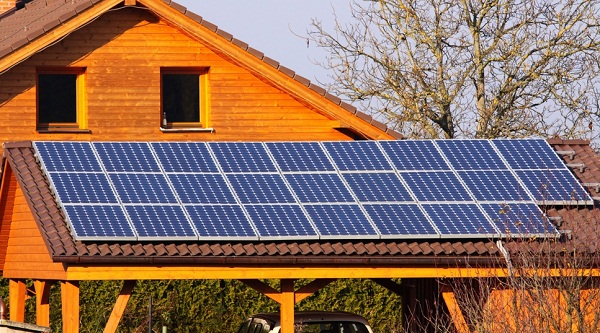SolarWorld and a coalition of U.S. manufacturers of crystalline silicon photovoltaic cells scored a victory of sorts in their fight against Chinese competitors today as the U.S. Commerce Department, in a preliminary ruling, ordered duties ranging from 2.9 to 4.73 percent on imports from China.
These countervailing duties, intended to offset what the U.S. determined to be unfair government subsidies provided to Chinese manufacturers, are small—small enough, in fact, for U.S. opponents of duties to claim a partial victory of their own. But this is just Act I in the drama. There’s a second, ongoing aspect to the case as well: the allegation that Chinese companies are selling their products in the United States at below cost. A preliminary decision on possible antidumping duties, which could add significantly to the penalties the Chinese companies would have to pay, is due in May.

In its announcement today [PDF], the Commerce Department said Suntech had received a preliminary subsidy rate of 2.90 percent, with Trina Solar at 4.73 percent and all others at 3.61 percent. The department also clarified the scope of its investigations, finding that they cover “not only imports of solar cells produced in China and solar modules/panels produced in China from Chinese-made solar cells, but also imports of solar modules/panels produced outside of China from solar cells produced in China.”
Under the ruling, the Chinese companies will now have to post bonds or cash deposits on their imports of solar cells and modules until a final decision is made in June. And because the U.S. earlier ruled that a surge in Chinese imports since SolarWorld filed its trade petition in October constituted “critical circumstances,” these duties would be applied retroactively to December 2011.
The complaint against the Chinese solar industry was brought by seven U.S. solar manufacturers, led by the Hillsboro, Ore.-based American unit of the German company SolarWorld AG. The companies said Chinese exports to the United States rose more than 300 percent from 2008 to 2010, and then skyrocketed in 2011, with exports in the month of July alone exceeding those from all of 2010. The group said the stunning ramp-up in exports was due to Chinese government subsidies and dumping margins “well in excess of 100 percent.”
For months SolarWorld was the only named member of the Coalition for American Solar Manufacturing (CASM), but in recent weeks two other companies—MX Solar USA of New Jersey and Helios Solar Works of Wisconsin—have revealed themselves. And, notably, when it responded to today’s ruling CASM didn’t quote SolarWorld USA’s head man Gordon Brinser, as has been its custom, but instead cited top officials at the two other named companies.
“Today’s announcement affirms what U.S. manufacturers have long known: Chinese manufacturers have received unfair and WTO-illegal subsidies,” said Steve Ostrenga, chief executive officer of Helios Solar Works. “We appreciate the Commerce Department’s hard work in bringing these subsidies to light, and we look forward to addressing all of China’s unfair trade practices in the solar industry.”
The allegations by the U.S. manufacturers inflamed the Chinese but have also prompted a bitter internal fight in the U.S. solar industry. SolarWorld and its CASM cohorts say that without protective duties, U.S. solar PV manufacturing jobs will be lost to China; installers and others in the solar supply chain—many of them gathered under the banner of the Coalition for Affordable Solar Energy (CASE)—say that duties could spell the end of the PV boom that has created tens of thousands of U.S. jobs.
CASE today expressed relief at the relatively small size of the duties set by Commerce.
“Today’s preliminary determination by the Department of Commerce imposing low tariffs on imported solar cells and modules is a relatively positive outcome for the U.S. solar industry and its 100,000 employees,” CASE President Jigar Shah said in a statement. “However, tariffs large or small will hurt American jobs and prolong our world’s reliance on fossil fuels. Fortunately, this decision will not significantly raise solar prices in the United States as SolarWorld has sought.”

The U.S. industry’s largest trade organization, the Solar Energy Industries Association (SEIA), has avoided taking sides on the matter. Responding to today’s ruling, it noted the preliminary duties were small enough that they would not “have a material impact on the U.S. market.” But it added that the antidumping decision could change that, and voiced concern about the broader impact of any duties.
“The trade action against Chinese imports is indicative of a growing trend of trade conflict in the global solar energy industry that threatens to curtail the rapid growth we have seen in this market—both in the U.S. and abroad,” Rhone Resch, president and CEO of SEIA, said in a statement. “Governments and industry must recognize that while trade remedy proceedings such as anti-dumping and countervailing duty investigations are an important part of the global trade rules, so too are collaboration and negotiations. This is why SEIA is taking a proactive lead to create a dialogue with several leading national solar trade associations and governments from around the world.”
The PV industry worldwide has been struggling under the weight of intense price pressure. Overcapacity brought on by a huge buildup in 2009 and 2010 is one reason. Slackening global demand, in Europe in particular, is another. But SolarWorld et al. charged last October that China, with its state-supported exports, has “been the primary cause for a 40 percent decline in world market prices.”
And it held China accountable for seven U.S. solar plants shuttering in the previous 18 months, “resulting in the elimination of thousands of jobs in Arizona, California, Massachusetts, Maryland, New York and Pennsylvania.”